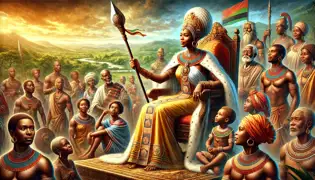Angola in the 17th century was a land of beauty and strife, a place where verdant landscapes stretched toward the horizon, punctuated by rivers that shimmered under the sun. But it was also a battleground. The Portuguese, hungry for power and profit, sought to dominate the region through the transatlantic slave trade and colonial conquest. Against this tide of foreign aggression rose a leader whose courage and cunning would echo through the ages. Queen Nzinga of Ndongo and Matamba was not just a warrior and a diplomat but a symbol of resistance. Her story is entwined with a spear—not only as a weapon of war but as a powerful emblem of her unwavering spirit and unyielding resolve. Nzinga was born in 1583 into the royal family of Ndongo, a kingdom nestled in the fertile lands of what is now Angola. Her father, King Kiluanji, was a formidable leader who sought to protect his kingdom from Portuguese encroachment. Nzinga grew up in a palace surrounded by the clamor of court politics and the whispers of war. From an early age, she showed an exceptional intelligence that set her apart from her siblings. Her father, noticing her keen mind, allowed her to attend council meetings. These gatherings were tense affairs, where elders and warriors debated strategies to counter the Portuguese. Nzinga listened intently, her young mind absorbing the complexities of diplomacy and warfare. One evening, after a particularly heated discussion, her father turned to her and said, "A ruler must be like a spear—sharp, strong, and unyielding. Remember that, my child." As Nzinga grew, so did her skills. She learned to wield a spear with precision, her small frame belying her strength. She practiced alongside the warriors, earning their respect through her determination. These early lessons forged the foundation for the leader she would become. Nzinga’s journey to power was not a direct one. Upon her father’s death, her brother Mbandi ascended the throne. Unlike Nzinga, Mbandi was indecisive and insecure, traits that proved disastrous as the Portuguese tightened their grip on Ndongo. Their tactics were ruthless, using both military force and manipulative diplomacy to destabilize the kingdom. When the situation became dire, Mbandi called upon Nzinga to negotiate with the Portuguese. It was a desperate move, but he knew his sister’s reputation as a skilled orator and strategist. Nzinga accepted the task, though she understood the risks. The meeting took place in 1622 in Luanda. Nzinga entered the Portuguese governor’s chambers with an air of authority. When she saw there was no chair for her—an intentional insult meant to assert Portuguese dominance—she remained calm. Without hesitation, she ordered one of her attendants to kneel, creating a makeshift seat for herself. The governor, taken aback by her ingenuity, had no choice but to treat her as an equal. Nzinga’s eloquence during the negotiations was unmatched. She secured a treaty that offered a temporary reprieve for her people. But she knew the Portuguese could not be trusted. As she left the meeting, she resolved to prepare for the battles ahead. Nzinga’s life took a dramatic turn after her brother’s sudden death, rumored to be a suicide, though some whispered that Nzinga had a hand in it. Regardless of the truth, she seized the throne, declaring herself Queen of Ndongo. Her ascent was controversial; many questioned a woman’s ability to rule, especially during a time of war. But Nzinga met these challenges head-on. One of her first acts as queen was to relocate her people to the region of Matamba, a move that proved both strategic and symbolic. Matamba was a fertile and defensible area, and Nzinga used it to rebuild her kingdom. She welcomed escaped slaves, deserters, and anyone willing to fight for freedom. Under her leadership, Matamba became a sanctuary and a stronghold. Nzinga understood that strength came not only from the battlefield but also from alliances. She reached out to neighboring kingdoms and even forged an unlikely partnership with the Dutch, who were also enemies of the Portuguese. This network of alliances became a cornerstone of her resistance. Nzinga was not a ruler content to sit in a palace. She led her troops into battle, clad in armor and wielding a spear that had become a symbol of her leadership. Her warriors spoke of her fearlessness, recounting tales of how she stood at the front lines, inspiring them with her courage. Her military strategies were as innovative as her diplomacy. Nzinga adopted guerrilla tactics, using the dense forests and winding rivers of Angola to her advantage. She and her warriors struck Portuguese forces where they least expected, vanishing into the wilderness before a counterattack could be mounted. Her spear, always by her side, became a beacon of hope. It was said that as long as Nzinga carried her spear, her people would never fall. The spear was more than a weapon—it was a statement, a promise to her people that she would fight for their freedom with every fiber of her being. The path to freedom was fraught with challenges. The Portuguese were relentless, and Nzinga faced betrayal from within her own ranks. Yet she persevered. Each setback was met with a renewed determination to protect her people and her land. Nzinga also worked to strengthen the cultural and spiritual fabric of her kingdom. She revitalized traditional practices, ensuring that her people’s heritage remained intact even as they faced the onslaught of colonial influence. She declared that the land, its rivers, and its forests were sacred, belonging not to any foreign power but to those who had lived there for generations. The queen’s resilience became legendary. Even as the years passed and her battles grew more difficult, Nzinga never wavered. Her people revered her not only as a ruler but as a symbol of their collective strength. Nzinga ruled Matamba until her death in 1663, nearly 40 years after she first ascended the throne. By then, she had transformed her kingdom into a powerful and enduring symbol of resistance. Her spear, preserved as a relic, became a testament to her courage and an inspiration for future generations. To this day, Nzinga is celebrated not only in Angola but across Africa and the world. Her story is a reminder that even in the face of overwhelming odds, the strength of a determined leader can change the course of history. Queen Nzinga’s spear was not just a tool of war but a beacon of hope, a symbol of defiance, and a testament to the power of resilience. Her life stands as a powerful narrative of what it means to lead with courage, wisdom, and an unshakable commitment to justice. The story of Nzinga is more than history—it is a call to remember the strength that lies within us all.A Childhood of Fire and Steel

The Weight of Leadership

The Queen Ascends
A Warrior’s Resolve

Trials and Triumphs
A Legacy Forged in Steel

Conclusion
The Queen Nzinga’s Spear
Reading Time: 6 min

About Story: The Queen Nzinga’s Spear is a Historical Fiction Stories from angola set in the Renaissance Stories. This Dramatic Stories tale explores themes of Courage Stories and is suitable for All Ages Stories. It offers Historical Stories insights. The legendary rise of Queen Nzinga and her fight for freedom in Angola.

















